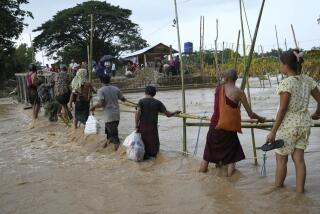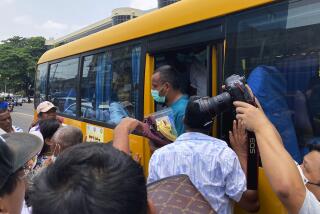U.N. diplomat in Myanmar to discuss protests
NEW DELHI — A U.N. special envoy arrived in Myanmar on Saturday for talks with the country’s military rulers, whose ruthless crackdown on anti-government protesters has sparked international outrage.
The streets of Myanmar’s main city, Yangon, were virtually empty of demonstrators for the first time in nearly two weeks and devoid of the gunfire and chaos that marked three days of violent suppression by soldiers and police. Security forces continued to patrol and seal off parts of the city, including the Buddhist monasteries whose monks spearheaded the protests.
After landing in Yangon on Saturday afternoon, United Nations envoy Ibrahim Gambari immediately traveled to the new capital of Naypyidaw, near Pyinmana about 200 miles to the north, where the generals who rule Myanmar live in relative isolation from the people.
Details of Gambari’s schedule were not available, nor was it clear whether he would be allowed to visit pro-democracy leader Aung San Suu Kyi, a Nobel Peace Prize laureate who is under house arrest and has been detained for most of the last 18 years.
“I expect to meet all the people that I need to meet,” Gambari said in Singapore before departing for Myanmar, also known as Burma. He did not elaborate.
In Washington, Gordon Johndroe, a spokesman for the White House National Security Council, urged Myanmar’s leaders to give Gambari “access to all those he wishes to meet with, including religious leaders as well as Aung San Suu Kyi.”
Analysts question how much Gambari, a former Nigerian foreign minister, can achieve in talks with an iron-fisted junta that has repeatedly shown itself impervious to outside pressure.
His mission to Myanmar reflects the growing international concern and anger over the generals’ brutal clampdown on protesters, in which the government acknowledges that 10 people have been killed. Diplomats and dissident groups estimate the death toll to be many times that figure, as high as 200.
Some observers feared a repeat of a 1988 massacre of pro-democracy protesters in which an estimated 3,000 people were killed.
The demonstrations began last month in response to steep fuel price increases but soon became an outlet for anger over 45 years of autocratic military rule. Last week, as many as 100,000 people marched in central Yangon, also known as Rangoon, including a large number of monks, who are revered in this predominantly Buddhist country.
The uneasy quiet on Yangon’s streets Saturday, however, suggested that the armed crackdown that began Wednesday may have succeeded in containing the biggest challenge to the military’s rule in nearly 20 years.
“Peace and stability has been restored,” state-run newspapers said. The authorities had handled the protests “with care, using the least possible force.”
Small groups gathered to taunt and curse soldiers and police but quickly escaped through alleyways when authorities began to charge, the Reuters news service reported.
Internet connections remained cut off, constricting the flow of photographs and video that had helped galvanize world opinion against the junta.
“The strategy is to neutralize the demonstrators, and they seem to have done that very effectively,” said Tim Huxley, executive director of the International Institute for Strategic Studies-Asia.
Human rights organizations and Burmese activist groups in exile have called on leading nations, especially China, Myanmar’s traditional ally, to pressure the regime to stop using force against its opponents. The U.S. has imposed new sanctions on Myanmar, and the Assn. of Southeast Asian Nations, one of the few multilateral organizations to which Myanmar belongs, issued a statement expressing its “revulsion” over the bloody crackdown.
On Saturday, British Prime Minister Gordon Brown said, “I hope the Burmese regime can be told today by Mr. Gambari just how seriously we view this, and that there is a huge anger across the world about the deaths and about the violence that’s been perpetrated against the Burmese people.”
But international condemnation, and efforts such as Gambari’s visit, probably will have little effect, Huxley said.
“External leverage is extremely limited,” he said. “There’s been a variety of external pressure over the years -- the dramatic approaches, including successive U.N. envoys who have made representations and failed, representations in very muted form by fellow members of ASEAN and sanctions imposed by Western countries to varying degrees -- and none of them have had significant effect.”
More to Read
Sign up for Essential California
The most important California stories and recommendations in your inbox every morning.
You may occasionally receive promotional content from the Los Angeles Times.











